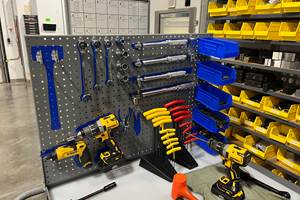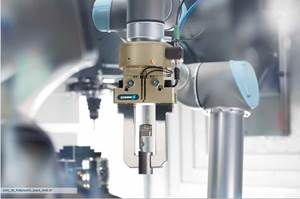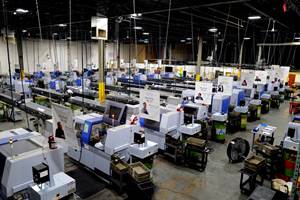Machine Shops’ Most Important Needs Are Universal
Haas Automation describes its international strategy.In manufacturing, says a company leader, the most important factors are physical and economic considerations that are independent of nationality.
Share





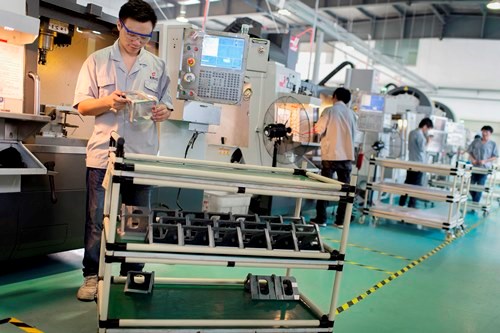
An example of a Haas customer overseas: The Eric Company of Suzhou, China has 16 Haas CNC machine tools, including the VF-2SS machines seen in this image. The small manufacturer splits its production between making parts for aerospace, medical and precision equipment applications.
Is Haas Automation’s strategy for serving the CNC machine tool market the right choice for America, or is it more of a global strategy that also provides the right framework for serving other countries’ markets? I recently had the chance to spend time with Haas Automation General Manager Robert Murray. He says this is an important question, and the company has given it serious thought.
Haas’s success is hard to dispute. If there is a ubiquitous machine tool brand in the United States, this is it. I visit a lot of shops. Routinely, I find at least one Haas machine in a facility, while many shops are essentially Haas-only sites that see no reason to switch to a different brand. While the company does not win every sale, the company does get serious consideration from many or most machine tool buyers. It makes the short list more often than not.
Mr. Murray says the company still has ample room to grow its market in North America, but the even better opportunities for Haas to grow its business are in Europe and Asia, where its current market share is much smaller. The question then becomes: Is the formula that has succeeded so far reproducible and exportable? Does it work in other cultures?
Mr. Murray says he is convinced the answer is yes, and here is why:
He says there could not be a more universal experience than that of making machined parts. In every case, in every country, the manufacturer wants to make the part to specification as consistently as possible, as quickly as possible and for the lowest cost possible. Culture is important, and culture colors the way customers are served and the way customer relationships are sought and developed. However, in manufacturing, the most important factors are physical and economic considerations that are independent of nationality.
Even the pain points are universal, he says. The difficulty with finding skilled labor is a problem that seems to beset every manufacturer in every country. The company’s efforts to engineer machine tools with this limitation in mind are relevant to every market.
To be sure, certain machine types are representative of the needs of particular markets, he says. Haas’s VF-2SS is a production-oriented vertical machining center with 30 inches of X-axis travel. This machine makes sense for a lot of the machining done in China. Meanwhile, the UMC-750 is a full five-axis vertical machining center with a price point that is low relative to other five-axis machines. The machine is popular in Western Europe, where five-face machining is common as a means of reducing setup time.
Still, across all of these markets, he says that what machine tool users want is reliability, speed, economy, ease of use, ease of service and responsiveness when there is a service need. The company’s products, along with its “Haas Factory Outlet” service model, have been developed and refined with these priorities in mind, he says, and when the company looks for further ways to improve its product or its organization, it focuses on these areas. As long as these priorities continue to be paramount, he says the result will be a company and a product line suited not just to the home market but to international markets as well.
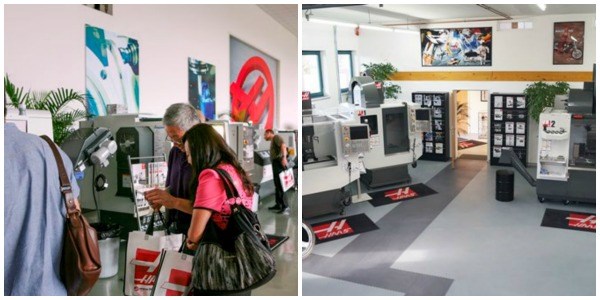
Haas Factory Outlets look the same in any country. The company aims for them to operate the same in any country as well. Here are views inside the showrooms of HFOs in China and Germany.
Related Content
Translating a Prototyping Mindset to Production
The experimental mindset that benefited BDE Manufacturing Technologies as a prototype job shop has given it an adaptable edge as a production facility.
Read More3 Ways Artificial Intelligence Will Revolutionize Machine Shops
AI will become a tool to increase productivity in the same way that robotics has.
Read MoreLean Approach to Automated Machine Tending Delivers Quicker Paths to Success
Almost any shop can automate at least some of its production, even in low-volume, high-mix applications. The key to getting started is finding the simplest solutions that fit your requirements. It helps to work with an automation partner that understands your needs.
Read MoreInside the Premium Machine Shop Making Fasteners
AMPG can’t help but take risks — its management doesn’t know how to run machines. But these risks have enabled it to become a runaway success in its market.
Read MoreRead Next
Registration Now Open for the Precision Machining Technology Show (PMTS) 2025
The precision machining industry’s premier event returns to Cleveland, OH, April 1-3.
Read MoreSetting Up the Building Blocks for a Digital Factory
Woodward Inc. spent over a year developing an API to connect machines to its digital factory. Caron Engineering’s MiConnect has cut most of this process while also granting the shop greater access to machine information.
Read MoreBuilding Out a Foundation for Student Machinists
Autodesk and Haas have teamed up to produce an introductory course for students that covers the basics of CAD, CAM and CNC while providing them with a portfolio part.
Read More






















.png;maxWidth=300;quality=90)



.jpg;maxWidth=300;quality=90)
